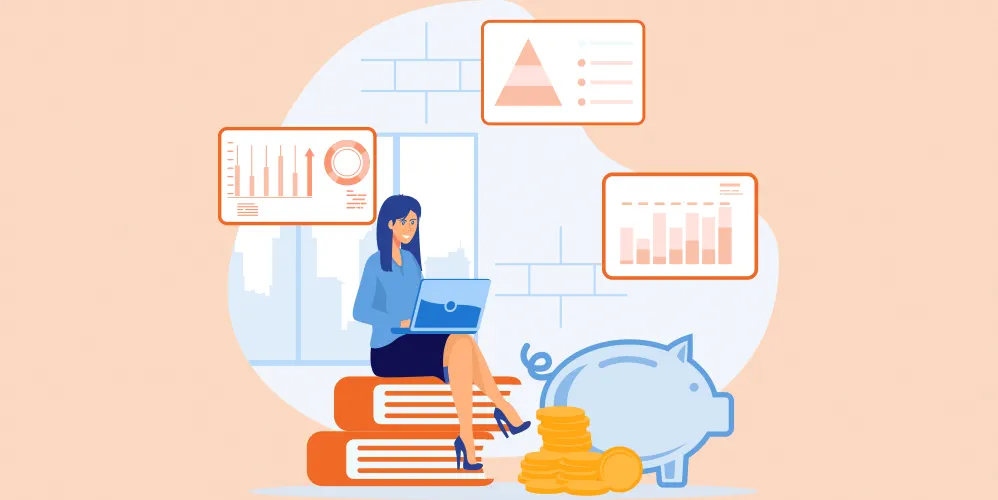
Understanding Inoperative/Dormant Bank Accounts: Risks and Solutions
22 फरवरी 2024

Table of Content
We all have that one drawer in our homes where we stow away things we rarely use. It might be old gadgets, dusty books, or random knick-knacks. Similarly, in the realm of personal finances, many of us have a drawer equivalent in the form of our unused bank accounts. When it comes to managing our finances, many of us have a similar tendency to forget about our inoperative accounts. We might open one with all the intention of saving money, but then life gets busy, and the account stays unused for months. Your bank savings account is inactive, much like those items tucked away in that drawer. In the world of banking, this is a big no-no. In this blog, we'll explore what a dormant account is and why you should avoid leaving your bank account dormant.
What is a Inoperative/Dormant or Inactive Bank Account?
So, what exactly is a Inoperative/Dormant or inactive bank account? Well, think of it as your piggy bank that you haven't tapped into for ages. If you haven't made any transactions using your savings account for more than two year, it's labelled as "inactive bank account." If you're even more neglectful and leave your bank account inactive for more than two/three years, it gets tagged as a "Inoperative/Dormant bank account." Now, why should you care about these labels? Let's find out.
The Importance of Not Leaving Your Savings Account Inactive
Your savings account is not just a digital piggy bank. It offers various benefits, and here are some compelling reasons why you shouldn't let a savings account become inactive:
1. Penalties from the Bank
One of the most critical reasons to keep an eye on your savings account is to avoid penalties. Most savings accounts have a minimum balance requirement. When your bank account is inactive, there's a good chance you won't meet this requirement. As a result, the bank may slap you with a penalty charge. This can eat into your hard-earned savings over time, eroding your account balance and causing you to lose out on any interest you might have earned.
2. Missing Out on Investment Opportunities
Your savings account isn't just a parking lot for your money. It can be a stepping stone to more lucrative financial options. When you leave a substantial sum of money sitting idle in your savings account , you miss out on the chance to invest it elsewhere. For example, you could have put that money into a Fixed Deposit, which often offers higher returns. By keeping your savings bank account inactive, you're essentially leaving potential profits on the table.
Also Read: Features & Benefits of Savings Account
3. Forfeiting Benefits and Offers
Savings accounts often come with additional perks and features. These can include reward points, special programs, and the ability to link to sweep-in Fixed Deposits , which allow your money to grow even faster. However, if your bank account remains unused, you won't be able to take advantage of these benefits. This means you're not maximizing the potential income you could generate from your savings account.
What Does a Inoperative/Dormant Account Mean for You?
If you ignore your savings bank account and let it become Inoperative/Dormant , you'll face limitations. You won't be able to write checks, renew your ATM/debit card, change your address on file, or perform any transactions through ATM, internet banking , or phone banking. In other words, an inoperative account tag can cause you to lose easy access to your inactive savings bank account!
So, what should you do if you have an unused bank account? It's simple. Consider closing the account if you no longer need it, or make sure to transact in it at least once a year to keep it operative. This way, you'll avoid those pesky penalties of an Inoperative/Dormant savings account, seize investment opportunities, and enjoy the full range of benefits that come with your savings account.
In conclusion, don't let your savings account be Inoperative/Dormant and gather dust in the digital vaults of your bank. Keep it active, keep an eye on your balance, and make the most of the opportunities your savings account offers.
Also Read: Savings Account Meaning & How it Works .
Popular Articles
Tag Clouds
Related Articles









What Is Joint Account? - Meaning, Benefits, Application Process & How its Work

-
डिस्क्लेमर
इस लेख/इन्फोग्राफिक/चित्र/वीडियो की सामग्री का उद्देश्य केवल सूचना से है और जरूरी नहीं कि यह बैंक ऑफ बड़ौदा के विचारों को प्रतिबिंबित करे। सामग्री प्रकृति में सामान्य हैं और यह केवल सूचना मात्र है। यह आपकी विशेष परिस्थितियों में विशिष्ट सलाह का विकल्प नहीं होगा । बैंक ऑफ बड़ौदा और/या इसके सहयोगी और इसकी सहायक कंपनियां सटीकता के संबंध में कोई प्रतिनिधित्व नहीं करती हैं; यहां निहित या अन्यथा प्रदान की गई किसी भी जानकारी की पूर्णता या विश्वसनीयता और इसके द्वारा उसी के संबंध में किसी भी दायित्व को अस्वीकार करें। जानकारी अद्यतन, पूर्णता, संशोधन, सत्यापन और संशोधन के अधीन है और यह भौतिक रूप से बदल सकती है। इसकी सूचना किसी भी क्षेत्राधिकार में किसी भी व्यक्ति द्वारा वितरण या उपयोग के लिए अभिप्रेत नहीं है, जहां ऐसा वितरण या उपयोग कानून या विनियमन के विपरीत होगा या बैंक ऑफ बड़ौदा या उसके सहयोगियों को किसी भी लाइसेंसिंग या पंजीकरण आवश्यकताओं के अधीन करेगा । उल्लिखित सामग्री और सूचना के आधार पर किसी भी वित्तीय निर्णय लेने के लिए पाठक द्वारा किए गए किसी भी प्रत्यक्ष/अप्रत्यक्ष नुकसान या देयता के लिए बैंक ऑफ बड़ौदा जिम्मेदार नहीं होगा । कोई भी वित्तीय निर्णय लेने से पहले अपने वित्तीय सलाहकार से सलाह जरूर लें।
How does Bank of Baroda stand out as the top choice for Salary Accounts?
Bank of Baroda Salary account is an account that goes beyond saving. It empowers the employee with attractive benefits. Bank of Baroda stands out as a compelling choice for the opening of Salary Accounts. Tailored to customers' needs, Bank of Baroda offers various types of Salary Accounts.
Step-By-Step Guide To Opening An NRI Account
As an NRI, having an NRI bank account in India is important for managing your finances. NRI Bank account opening is easy, but without proper information, it may seem like a challenge.

